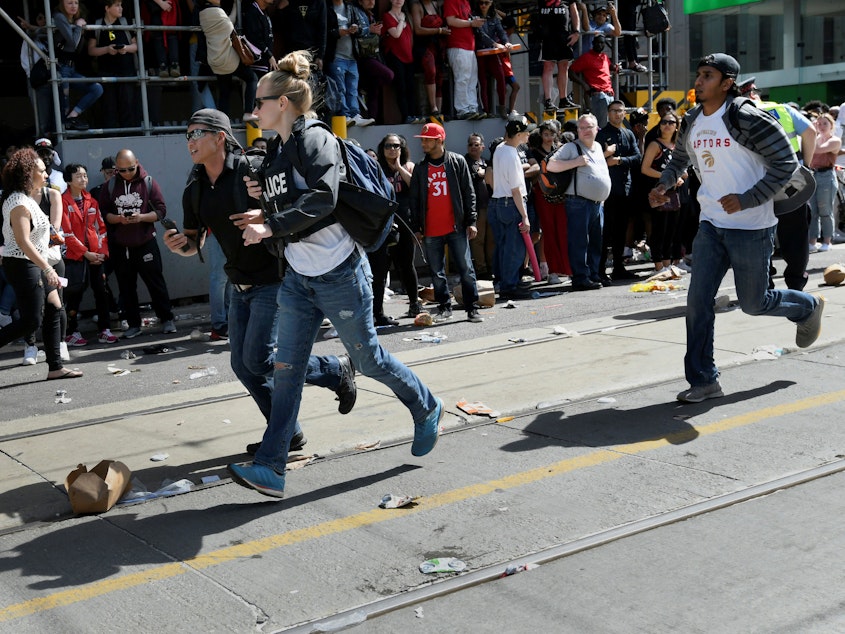Why Gun Violence Is Surging In Toronto

Gun violence is a growing problem in Canada's biggest city — and last year was Toronto's worst, with more shootings than any year to date, according to Toronto police statistics.
The highest profile incident came in June, when shots rang out as more than a million fans gathered in Nathan Philips Square to celebrate the Toronto Raptors' first-ever NBA championship. Four people were injured in the shooting and a panicked stampede of fans ensued.
That was followed by 14 separate incidents of gun violence over one weekend in August.
By the end of 2019, more than 760 people had been shot in the city, 44 of whom were killed, according to Toronto Police. That's triple the number of shooting victims in the city in 2014.
Canada has tighter gun laws than in the U.S. and suffers much less gun crime, so for many citizens, the sharp rise in gun violence in Toronto is shocking. City officials and gun control advocates are trying to figure out why the surge is happening — and what they can do to stop it.
Sponsored
Unlike in the U.S., there is no right to bear arms in the Canadian constitution, meaning it is easier for the government to legislate gun control — and there are far tighter restrictions on gun sales. Standard hunting rifles can be fairly easily purchased with a license. But people who want to buy weapons like handguns and semi-automatic rifles must undergo deep background checks and abide by detailed restrictions on how and where to use those types of firearms.
The Conservative government in power from 2006 to 2015 worked to ease rules on gun owners, principally by dismantling in 2012 a national gun registry, a mandatory list that gun owners had to sign onto with each purchase. This was followed by a spike in firearm imports from the U.S., according to the latest Canadian Commission on Firearms report. Nearly 2 million firearms were imported for sale. And since 2013, the number of restricted weapons, like semi-automatic rifles and handguns, purchased in Canada has grown by 50% to over a million total.
The weakening of national gun control legislation has had an impact on gun crime in Toronto, says Wendy Cukier, head of the Toronto-based Coalition for Gun Control, one of Canada's leading gun control advocacy organizations. "As we progressively strengthened gun control in Canada," she says, "we saw the rates of gun violence, particularly suicide, violence against women and so on, fall. And for the last few years, we've seen an uptick."
According to Canada's government statistics agency, gun violence overall rose by over 40% in Canada between 2013 and 2017, with much of that increase driven by incidents in Toronto.
Toronto Police Chief Mark Saunders says that the city's recent gun violence has been connected to gang activity.
Sponsored
In a press conference in August, he said the Raptors incident and the August shootings "by and large have street gang connotations to them," pointing to the gang membership of the victims and those arrested. There is a thriving gang culture in Toronto centered on the illegal drug trade, largely in the city's poorer outer suburbs.
Saunders, and others including the Toronto Board of Health, believe the growth in gang activity is partly rooted in the city's growing gap between rich and poor. As Canada's finance hub, the city's economy is booming. The average price of a detached home doubled to almost $1 million in the past decade, making it one of North America's most expensive cities, according to Toronto real estate data.
That's led to rising "inequality in terms of opportunities, in terms of access to fairness and justice," says Cukier. "And we're seeing the divisions in Toronto increasing in recent years."
Saunders has noted there will be challenges in addressing those divisions. "I've said in the past if the expectations are that we are going to arrest ourselves out of this, we simply are not," he said in August. "There are social issues that are related to this. People are not born to be street gang members. It takes a multi-pronged approach to get this right."
Gun control advocates in Toronto, including Mayor John Tory, have been calling for a national handgun ban since a 2018 mass shooting in the city's upscale Danforth neighborhood, which left three people dead and 13 injured. The Liberal government of Prime Minister Justin Trudeau has declined to propose such a ban, wary of alienating more conservative rural and western Canadian voters, who are more likely to own firearms.
Sponsored
But the Trudeau government has promised to introduce legislation within the next year for a national ban on military-style assault rifles, complete with a program to buy back those firearms from willing gun owners. And with the combined support in Parliament of the governing Liberals and the left-leaning New Democratic Party, the assault weapons ban legislation likely has the votes needed to pass into law. [Copyright 2020 NPR]
